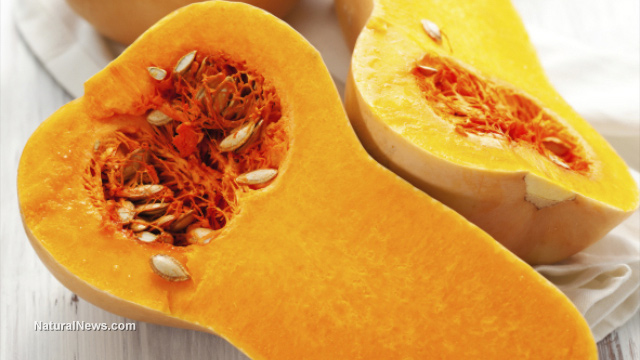
Advertisement
Butternut squash is an amazing superfood full of nutrients like dietary fiber, potassium and vitamin A. It’s also one of the most common varieties of winter squash.
But did you know that despite it’s name, winter squash is grown in the summer and harvested in the fall? Butternut squash, which has a thick, tough exterior and firm flesh, can be stored for several months, so you can stock up until the winter season.
Aside from being full of nutrients, butternut squash also offers many health benefits, like improving your digestive health and preventing cancer.
The nutritional profile of butternut squash
According to the Department of Agriculture‘s (USDA) National Nutrient Database, a one-cup serving (205 grams) of cooked, cubed butternut squash, contains the following nutrients:
- 582 milligrams (mg) of potassium
- 84 mg of calcium
- 59 mg of magnesium
- 55 mg of phosphorus
- 31 mg of vitamin C
- 1.23 mg of iron
- 1144 micrograms (mcg) of vitamin A
Additionally, butternut squash contains folate, manganese, niacin, pantothenic acid, thiamin and vitamin B-6 and E. The same serving of cubed butternut squash also provides 582 mg of potassium, which is more than the amount you’ll get from one banana.

8 Reasons to cook with butternut squash
Following a balanced diet and eating lots of fruits and veggies can help lower your risk of many health problems.
Eating superfoods like butternut also offers these incredible health benefits:
It can lower your cancer risk
Research suggests that people who follow diets rich in carotenoids like beta-carotene are less likely to develop colon cancer.
Here are other superfoods full of beta-carotene:
- Apricots
- Broccoli
- Cantaloupe
- Carrots
- Dark leafy greens like kale and spinach
- Peas
- Pumpkin
- Red and yellow peppers
- Romaine lettuce
- Sweet potatoes
These spices also contain beta-carotene:
- Cayenne
- Chili
- Cilantro
- Coriander
- Marjoram
- Paprika
- Parsley
- Sage
It can help prevent asthma
According to some studies, consuming foods rich in beta-carotene can help lower your risk of developing asthma. Beta-carotene is the antioxidant that gives fruits and vegetables like butternut squash their bright orange hue.
It can help lower and prevent high blood pressure
You can naturally maintain healthy blood pressure by getting enough potassium in your diet and reducing your sodium intake.
According to the American Heart Association (AHA) and the Institute of Medicine (IOM), the average adult needs 4,700 mg of potassium per day.
However, the National Health and Nutrition Examination Survey (NHANES), reports that the diet of most American adults contains too much sodium and not enough potassium. Less than two percent of adults in the country consume the daily recommended amount of potassium.
Research has shown that getting enough potassium in your diet helps lower your risk of death from stroke and heart disease, along with other causes of mortality.
Butternut squash is good for those with diabetes
If you have Type 1 diabetes, eating foods rich in dietary fiber can help lower your overall blood sugar levels. And if you have Type 2 diabetes, following a high-fiber diet will help improve your blood sugar, lipids and insulin levels.
A one-cup serving of butternut squash provides about 6.6 grams of fiber. According to the AHA, you need 25 grams of fiber a day if you’re following a 2,000 calorie diet.
It’s good for your digestive health
Getting enough dietary fiber is key to a healthy digestive tract. It also helps prevent constipation.
According to research, dietary fiber can also minimize inflammation and boost immune function, meaning butternut squash may help reduce your risk of developing conditions linked to inflammation like cancer, heart disease, diabetes and obesity.
Getting enough fiber regularly may also lower blood pressure and cholesterol levels, increase “good” gut bacteria and promote weight loss if you are obese.
It promotes better immune function
Superfoods like butternut squash full of both beta-carotene and vitamin C is good for your immune health. Research indicates that eating a lot of foods rich in dietary fiber can help improve your immune function.
It can make your skin and hair healthier
Butternut squash is good for your hair and skin because its rich in vitamin A. This nutrient is needed for sebum production, which keeps your hair moisturized.
Vitamin A also is crucial for the growth of all bodily tissues, such as your skin and hair.
A one-cup serving of butternut squash provides more than 50 percent of the daily required vitamin C intake. The vitamin also helps build and maintain collagen, which gives structure to your skin and hair.
Considerations before eating butternut squash
Butternut squash is a superfood that’s generally safe to eat. However, winter squash is high in potassium and some individuals should consume it in moderation.
If you have a heart condition, you should limit your intake of butternut squash, especially if you take beta-blockers. These kinds of medication are may cause potassium levels to increase in the blood.
You should also avoid eating butternut squash if you take other medications for heart failure, like ACE inhibitors and diuretics.
While you can consume high-potassium foods like butternut squash in moderation if you take beta-blockers and ACE inhibitors, some people who are on beta-blockers will have a higher risk of hyperkalemia. This condition occurs when you have too much potassium in your blood.
Mild symptoms of hyperkalemia may include muscle weakness, nausea, numbness, tingling, or other unusual feelings. Severe symptoms of hyperkalemia can include chest pain, heart palpitations, shortness of breath, nausea, or vomiting.
Watch you potassium intake if you have kidney problems. If the kidneys are unable to remove excess potassium from your blood, it could be fatal.

How to add more butternut squash to your regular diet
When buying butternut squash, choose those that are heavy for their size and with tough, smooth rinds that are blemish-free. If you plan on storing the butternut squash for a couple of months, the thick skin means that butternut squash can be stored for a long time.
Here are some suggestions on how to cook with butternut squash:
- Pair it with ingredients like cinnamon and maple syrup for a dessert or make savory and spicy dishes using balsamic vinegar and smoked paprika.
- Cut the squash in half then add brown sugar, vanilla extract and toasted pecans before baking.
- Make chilled toffee apple creams with squash.
- Make quinoa salad with roasted butternut squash.
- Serve roasted butternut squash as a side dish.
- Add butternut squash to a vegetable soup.
- Prep butternut squash laksa.
- Use butternut squash as a substitute for potatoes.
- Butternut squash can also be used as a substitute in recipes that need pureed or canned pumpkin.
- Use squash to make chipotle chili.
- Make butternut squash lasagna.
- Make a tasty butternut squash risotto.
The next time you need a nutritious ingredient full of vitamin A, use butternut squash. The superfood will also help boost your digestive health and immune function.
Sources:
Advertisements







